It can seem hard to keep track of your weight loss success, but it doesn't have to be! If you have the appropriate attitude, it can be a lot of fun. Instead of seeing it as a chore, see it as an adventure. You can find out what works for you while also holding yourself accountable. So, let's look at some fun ways to keep track of your progress and celebrate the small wins along the way!
Top Takeaways and Key Concepts
Track consistently: Use journals, apps, or smart scales to monitor food, workouts, and body changes.
Set realistic goals: Focus on small, achievable objectives to stay motivated and avoid frustration.
Celebrate small victories: Reward minor successes to reinforce positive habits and sustain momentum.
Leverage community support: Join groups or share progress with friends to boost accountability and motivation.
Review and adjust regularly: Reflect on progress weekly or monthly to tweak routines and improve results.
Summary of This Article
This article emphasizes the importance of tracking weight loss progress to stay motivated, accountable, and informed. Consistently recording food intake, workouts, and body metrics—via apps, smart scales, or journals—helps identify patterns and maintain momentum. Setting realistic goals and celebrating small victories reinforces positive habits, while community support from friends, groups, or social media enhances accountability and encouragement. Regularly reviewing progress allows for adjustments in diet, exercise, or routines, making the journey both effective and enjoyable. Tracking is presented as a fun, engaging, and empowering way to achieve lasting weight loss success.
Why Tracking Matters

Please Note: This post may contain affiliate links. If you click one of them, we may receive a commission at no extra cost to you. As an Amazon Associate, I earn from qualifying purchases.
Tracking your food intake can be so effective that some people have turned it into a competitive sport—yes, there are apps where you can compete to see who can log the most meals! Forget the gym; just race your friends on calorie counting!
“Success is not just about what you accomplish in your life, it's about what you inspire others to do.” – Unknown
To begin with, tracking your weight loss is crucial for several reasons. First off, how else will you know if all those squats and salads are paying off? It’s like trying to find your favorite sock in a pile of laundry without looking—pretty tricky! Keeping a record helps you see patterns over time, which is super helpful in understanding what’s working and what might need tweaking.
Moreover, tracking can provide motivation when the scale isn’t moving as quickly as you'd like. We’ve all been there—one week you’re feeling fabulous because you lost two pounds, and then suddenly nothing happens for days on end. But don’t despair! When you look back at your records and see that you've consistently made healthy choices or increased your activity level, it reminds you that progress isn’t always linear.
Tracking Your Progress: The Good, the Bad, and the Funny
– Studies show that people who track their food intake can lose up to twice as much weight. So if your scale is a liar, at least your journal can be a truth-teller!
– Keeping a food diary might seem tedious, but remember: it’s just like journaling about your feelings—except this time, the calories won’t judge you!
– Ever heard of “calorie creep”? It’s when you forget to log those sneaky snacks! They’re like ninjas in your diet—silent but deadly.
– Research indicates that writing down what you eat can reduce mindless munching by 30%. So grab that pen; it’s time to give those chips a run for their money!
A lot of people say that writing down their goals makes them more likely to stick with them. It's like having a cheerleader in your pocket! Picture this: every time you write down a workout you did or a nutritious meal you ate, it's like giving yourself a high-five. This picture of how far you've come can be very motivating and fulfilling.
When you use an app to monitor your workouts or meals, the fast feedback can seem like magic. You type in those numbers, push save, and there it is! A record of all the hard work you've done. It's like keeping track of the score in a game; who doesn't want to see himself win? Every entry shows that you're on the correct track, which gives you a sense of accomplishment that makes you want to keep going.
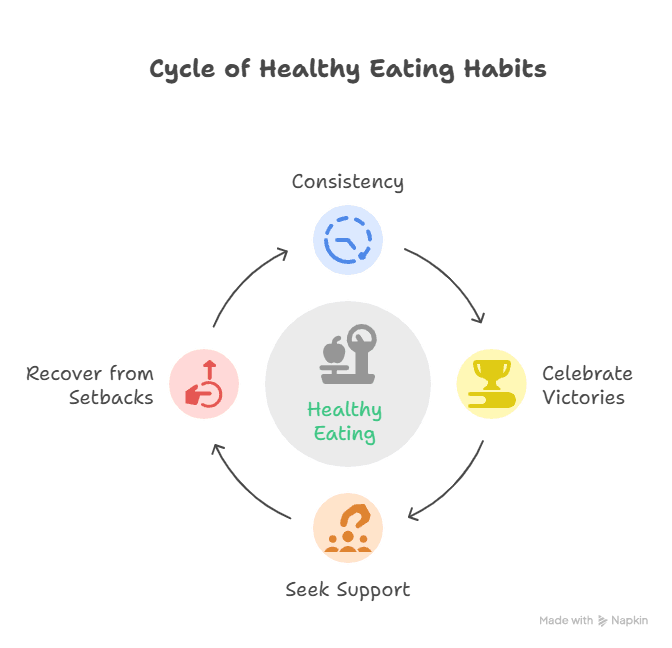
But we shouldn't forget about the old-fashioned notebook. Writing things down can be good for your mental health. You can draw cheerful faces next to days when you worked out hard or stars next to successes. Also, writing things down gives you time to think about them. You can see trends over time that help you make better choices in the future. Did that morning jog give you more energy? Write it down so you don't forget how good it felt!
Writing down your journey isn't just about the data; it's also a chance to tell a tale. Every step you take has its own story. For example, the times you picked salad over fries or got up early to run instead of hitting snooze one more time are all part of the experience. Writing down these stories helps you remember what you can do.
And speaking of momentum, keeping track of things helps you keep it going on those rough days that are sure to come. We've all had times when our motivation was lower than our favorite couch cushions. But when you look through pages full of wins, large and small, it reignites that fire in us! Looking back at how far you've come can give you the motivation to put on your sneakers again or make a healthy meal instead of ordering takeout.
In short, keeping track of your progress, whether it's through an app or just writing it down in a journal, keeps you motivated and turns what could be boring into something very amazing! So get out your journal or download an app. Every word you write down brings you one step closer to reaching your weight loss objectives. Who wouldn't want that type of support right at their fingertips?
Choosing Your Method
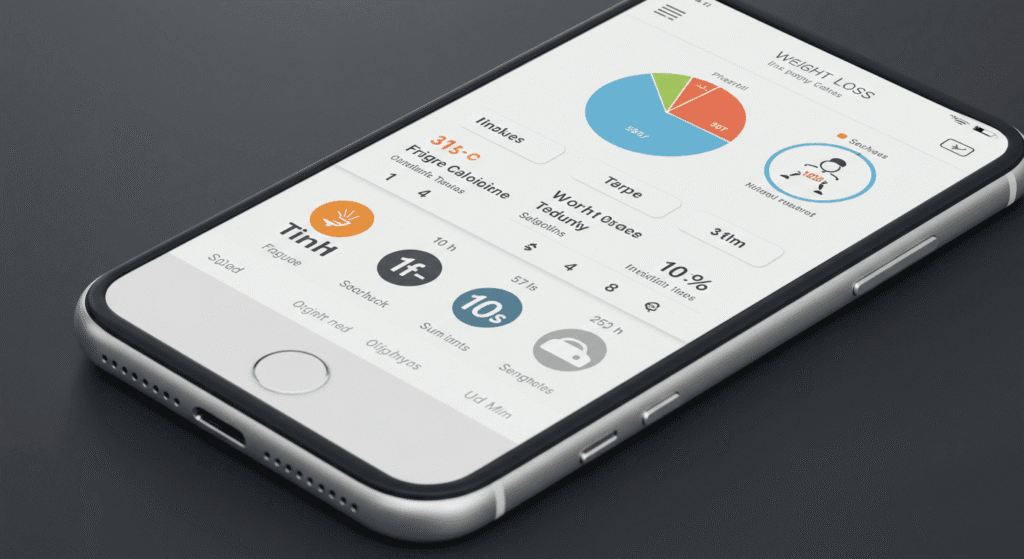
If you think choosing a diet is tough, consider this: there are people who have tried the “cookie diet,” where they eat cookies for every meal—because who wouldn’t want to lose weight while feeling like a kid again? Just remember, moderation is key; otherwise, you might end up with a cookie belly!
“I don’t count calories. I just eat what I want and try to be healthy about it.” – Jennifer Aniston
Now that we know why tracking is important, let's talk about how to do it right. There are a lot of different ways to do things, and each one is unique. People who use apps like MyFitnessPal or Lose It! to keep track of what they eat and how much they exercise swear by them. I mean, who wouldn't want technology to do half the work?
Some people, on the other hand, like to write in a journal using a pen and paper because they find it enjoyable to write things down. You could make colorful charts or graphs to show how far you've come. It's like art therapy and establishing fitness goals at the same time!
Choosing Your Method: Facts That Might Surprise You
– Did you know that people who eat breakfast tend to weigh less than those who skip it? So, if you’re trying to lose weight, maybe your first meal shouldn’t be “coffee and regrets”!
– Some studies suggest that eating with chopsticks can slow you down and help you eat less. Plus, it's a great way to impress your friends—who knew sushi could double as a workout?
– Ever heard of the “plateau effect”? It’s when your weight loss stalls, but don’t worry! It just means your body is taking a little vacation while you do all the hard work.
– If you're choosing between cardio and strength training, remember: lifting weights burns more calories at rest. So go ahead, lift those dumbbells—and feel like a superhero in the process!
But maybe you like high-tech gadgets more? If that's the case, welcome to the future of keeping track of your weight reduction! Having smart scales in your bathroom is like having a health assistant right there. You step on them, and with a beep and a flash of numbers, they connect to an app on your phone. All of a sudden, you're not just looking at your weight; you're also looking at things like body fat % and muscle mass. What a fancy thing to say!
These smart scales are a whole new level of cool. They can tell you how much water you're holding onto or if you've gained muscle instead of fat. When you weigh yourself, it's almost like doing a little science experiment. I all, who wouldn't want to know if that additional slice of pizza made them do more bicep curls? A lot of these devices also include capabilities that let you see how things change over time. You can see graphs and charts that show how far you've come. It's like being the star of a movie!
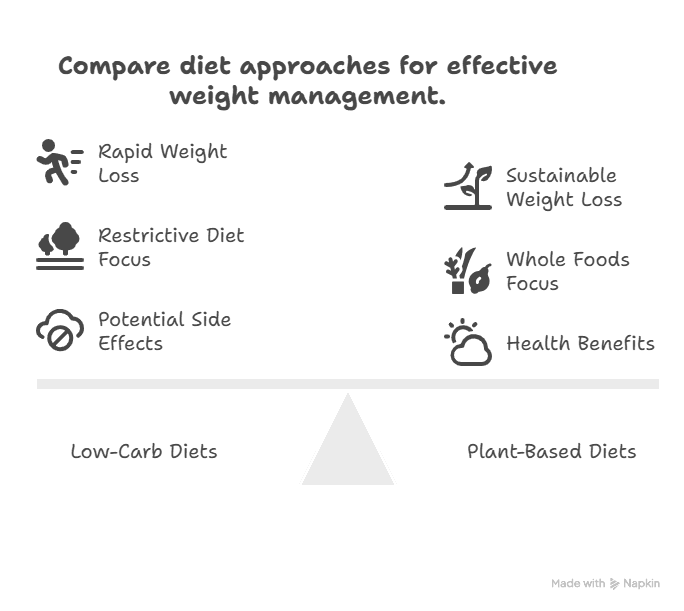
And let's be honest: it's much more satisfying to see those numbers alter on a screen than to just write them down in a notebook. It looks sophisticated and sleek, like you're part of a new fitness movement from the future! Some apps even let friends or family members who also have smart scales compete with each other in a fun way. You can set goals together and keep track of each other's progress.
But just because it's high-tech doesn't mean it has to be hard. In fact, keeping things simple is frequently the greatest way to stick to a plan. Finding the method that works best for you is the most important thing, whether you use a smart scale or a tape measure. Do you like getting quick feedback from technology? Or do you like the feel of writing things down better? It's fine with me if you do it your way.
This is where consistency is important! That's excellent if stepping on a smart scale every morning helps you keep focused on your goals. But if it starts to feel more stressful than helpful, don't be afraid to change gears. After all, the idea is to make progress, not to be flawless! Keep in mind that tracking should help you, not stress you out.
So, whether you use high-tech tools or just write in a journal, find what works for you and stick with it! Enjoy the road since every step matters toward reaching your health goals. You never know what will happen. Maybe one day you'll be able to wow everyone at dinner parties with those great data and show them how tech-savvy you are when it comes to losing weight!
Setting Realistic Goals
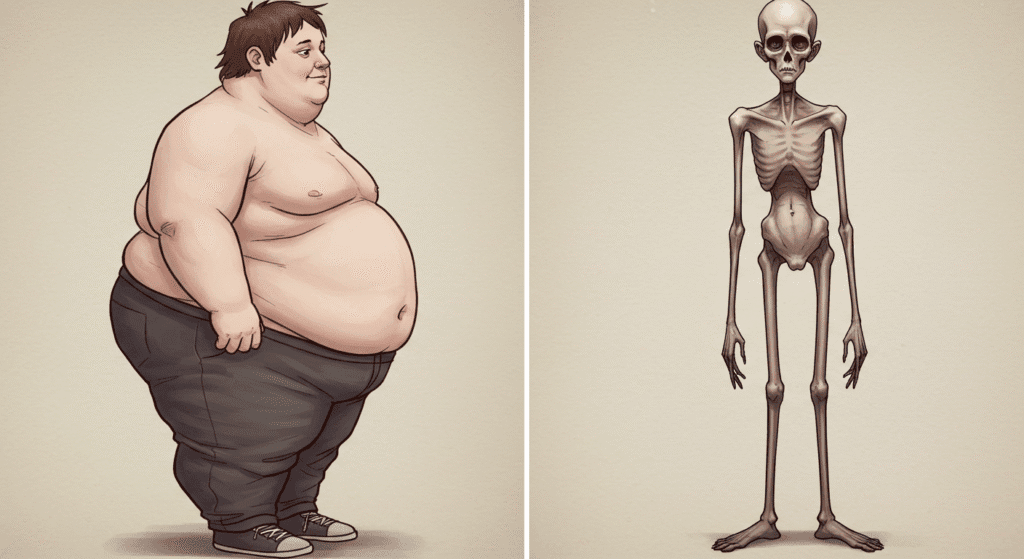
Studies show that people who set realistic goals are more likely to succeed—so if your goal is to lose weight by eating nothing but kale and running marathons, you might want to consider aiming for “not finishing an entire pizza in one sitting” first!
“The only way to make sense out of change is to plunge into it, move with it, and join the dance.” – Alan Watts
Let's be honest for a moment: it's important to set realistic goals if you want to stay motivated on this trip. If I claim I'm going to drop 20 pounds in a month (spoiler alert: I won't), I'm just going to be disappointed, and nobody wants that! Instead, set modest goals along the way.
For example, don't just think about how much weight you want to lose; also think about your exercise level or health markers. Set a goal to exercise for 10 more minutes than you did last week or to eat more vegetables with every meal. Those are things you can do!
Setting Realistic Goals: Fun Facts to Keep You Motivated
– Studies show that people who set specific goals are more likely to succeed. So instead of saying, “I want to lose weight,” try, “I will lose five pounds by the end of the month—while still enjoying pizza on Fridays!”
– Research indicates that writing down your goals can make you more accountable. Just remember, if you write “exercise daily” in invisible ink, it doesn’t count!
– Did you know that celebrating small victories can boost your motivation? So go ahead and throw a mini dance party when you choose a salad over fries—just don’t be surprised if your dog joins in!
Staying motivated over time can be a lot easier if you celebrate these modest accomplishments. Really, think about it! Were you able to do three workouts this week? That's great! It should be celebrated a little, right? So go ahead and give yourself a pat on the back. It's best not to do it while holding a piece of cake, but we are human! You could get yourself something exciting, like a new exercise playlist. Nothing gets you ready for the following session like listening to new music through your earbuds.
It's important to recognize your progress because it helps you build good habits without placing too much pressure on yourself. You reinforce your positive choices when you take the time to recognize what you've done, such sticking to your food plan or selecting water over soda at lunch. It's like giving yourself a high-five every time you do something good for your health. And who doesn't like high-fives?
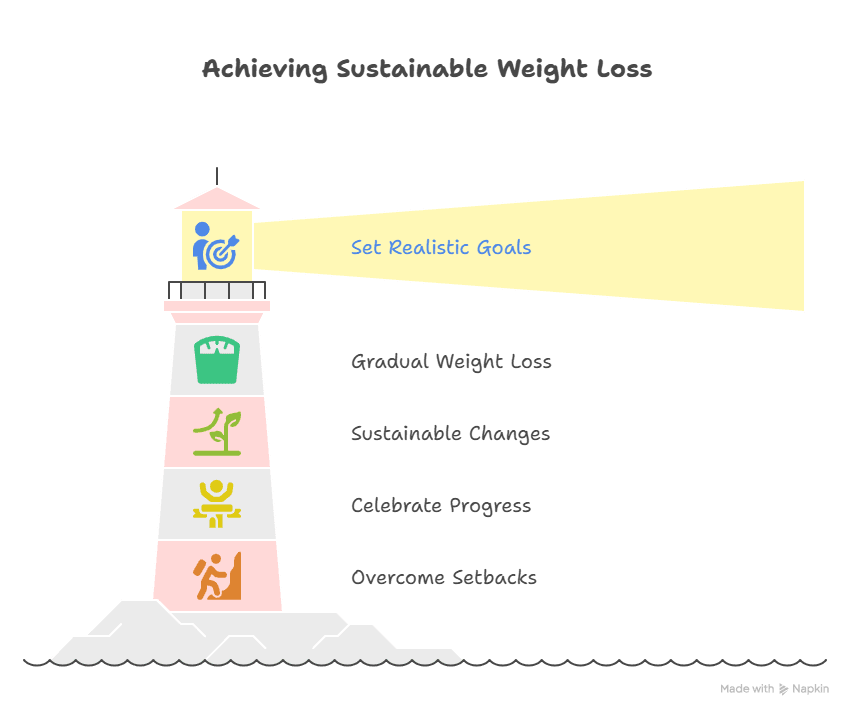
Let's be honest: losing weight can often feel like a battle. Some days, you might want to give up and watch your favorite show all day with a bowl of popcorn (extra butter, please). But those modest wins become stepping stones instead of hurdles when you celebrate them. It changes your mind from “I have so far to go” to “Look how far I've come!” That kind of good mood spreads!
And when it comes to celebrations, they don't always have to include food or other prizes. Sometimes all it takes is a moment to think about how good it feels to fit into those trousers that used to be too tight. Or maybe it's the endorphin surge you get after working out for a month straight. You should be proud of such feelings!
It's interesting that discussing these accomplishments with friends or family can make the happiness even stronger. Imagine blogging about your successes on social media and getting a lot of encouraging comments from friends and family! It makes everyone feel like they're part of a community where they can celebrate together. Also, having people who cheer you on makes the journey feel less lonely.
Regular check-ins with oneself can also help you stay motivated over time. Take some time each week, maybe during Sunday coffee, to think about what went well and what problems you had. Did you reach that workout goal? Great! Did life get busy and mess up your schedule? It's not a big deal; just change and keep going.
In the end, celebrating minor triumphs isn't just about feeling good; it makes you stronger and keeps you going while you work toward bigger ambitions. The road may be bumpy, but every win will make you more determined. Before you know it, you'll be racing toward success with new confidence! So keep in mind that every step matters; welcome them all!
The Power of Community Support

Joining a weight loss group can be so effective that some people claim the only thing heavier than their emotional baggage is the dumbbell they lift while sharing their struggles!
“Weight loss is not just about what you eat, but who you share your meals with.” – Oprah Winfrey
Speaking of support, let's talk about how the community can help! Finding friends or clubs with the same weight-loss goals can make this lonely journey into a fun team activity. Have you ever posted about your progress on social media? You'd be astonished at how many people are behind you!
Online forums and local gatherings are also fantastic places to meet new people and make friends while sharing tips. Also, talking about problems makes them seem less big. It's nice to know that other people have the same problems.
The Power of Community Support: Fun Facts to Inspire You
– Studies show that people who have a workout buddy are more likely to stick to their fitness goals. Plus, it’s way more fun to complain about burpees together!
– Sharing your weight loss journey on social media can lead to increased accountability. Just remember, if you post a gym selfie, you might want to skip the filter that makes your bicep look like a grapefruit!
– Research suggests that joining a support group can lead to better results. It turns out that crying over kale is much easier when you have friends doing it with you!
And you know what? When you celebrate each other's successes, it makes the room feel good and everyone feels supported instead of condemned. Isn't that a nice change? Because let's be honest, there are days when pizza feels like our best buddy, right? You know those times when you're looking at a piece of food and thinking about whether or not it should be your emotional support food for the night? Trust me, you’re not alone in this culinary conundrum!
When we support one other and recognize progress, no matter how modest, it builds a sense of community that may be very strong. It's like being in a secret society where the only thing you have to do to join is wish to be healthier. I mean, who wouldn't want to be a part of that? When you talk about your successes with others, you make it easier for them to talk about their problems as well. Those late-night snack desires don't seem so bad anymore since, let's face it, we've all been there!
Speaking of reaching out, have you ever thought about how many individuals around you might be going through the same things? Whether it's coworkers looking at the donut box in the break room or buddies secretly wishing they could trade nachos for kale chips (but let's not get too crazy), getting to know them can lead to some great relationships. You might probably discover someone who wants to work with you to fight those annoying urges! Imagine teaming up with a pal for healthy meal planning sessions or daring each other to avoid that enticing dessert cart after dinner.
And here’s something interesting: when you praise someone else’s achievement—like meeting their step target for the week—you boost your own drive too! It's like setting oneself on fire while fanning the flames for other people. You start to wonder, “Why can't I do it?” This kind of good energy spreads faster than rumors at a family gathering. Before long, everyone is lifting one other up instead of bringing one another down.
We shouldn't forget about social media either! Sharing important events online can make this feeling of community even stronger. A simple post that congratulates your friend on their weight loss or their decision to eat healthier will get other people involved in the topic. They might weigh in with words of support or even share their own stories—creating a ripple effect of optimism and accountability.
Of course, helping each other doesn't mean dismissing problems; it means knowing that problems are a normal part of the trip. Some days will be harder than others (insert dramatic music). But knowing there's someone rooting for you during those hard times makes all the difference. It reminds us that we are human and don't have to be perfect; what matters is that we keep going.
So next time you're feeling good about accomplishing a milestone—or just surviving another week without giving into every craving—don’t keep it to yourself! Share it with your group; invite them into your trip. Let's celebrate together! After all, life is a lot more enjoyable when we help each other instead of having pizza be our sole friend during hard times!
Reviewing Your Progress Regularly
Lastly, and this may seem apparent, but please bear with me: it's really important to check on your progress often! Taking stock is like checking to see if you've run out of coffee before brewing another pot (really, the horror!). It helps you make sure you're still on track to reach your goals.
Set aside time every week or month to look back on what went well and what may be better next time. We can make changes depending on what we learn from this reflection instead of persisting with routines that may not be working for us anymore.
So, whether you need to tweak your calorie intake based on how active you are or your workout routines based on how interested you are, you'll see that growth comes from looking at both your triumphs and your failures!
In conclusion, keeping track of your weight reduction progress doesn't have to be boring. Instead, look of it as an exciting journey with new things to learn at every turn.
Suggested Resources
The Importance of Tracking Weight Loss
https://www.healthline.com/nutrition/importance-of-tracking-weight-loss
How To Set Realistic Weight Loss Goals
https://www.webmd.com/diet/features/how-to-set-realistic-weight-loss-goals
Best Apps for Tracking Weight Loss
https://www.shape.com/fitness/tips/best-apps-for-weight-loss
Frequently Asked Questions
Why is tracking weight loss progress important?
Tracking helps you identify patterns, stay accountable, and see improvements beyond the scale, making long-term success more achievable.
What are effective ways to track my weight loss journey?
Journals, smartphone apps, smart scales, and progress photos are all helpful methods for monitoring food, workouts, and body changes.
How often should I track my progress?
Weekly or monthly check-ins work well, allowing you to notice trends, stay motivated, and adjust your goals or routines as needed.
What type of goals should I set for weight loss?
Set small, realistic goals focused on behavior—like increasing activity or improving food choices—to stay motivated and avoid burnout.
How can celebrating small wins help me stay motivated?
Recognizing minor achievements reinforces positive habits, boosts confidence, and keeps momentum strong throughout your weight loss journey.
Can community support improve weight loss success?
Yes, connecting with friends, groups, or online communities increases accountability, encouragement, and consistency over time.
What should I do if my progress slows or stalls?
Review your habits, adjust routines, and consider recalibrating goals. Plateaus are normal and often signal the need for small changes.

Kevin Collier is a dedicated health enthusiast and writer for FatFAQ.com, where he shares his expertise on weight loss and maintaining a healthy lifestyle. With a focus on practical tips and evidence-based strategies, Kevin aims to inspire readers to achieve their health goals through informed choices. His engaging articles cover nutrition, exercise, and holistic wellness, providing valuable resources for anyone looking to improve their well-being. Passionate about helping others transform their lives, Kevin advocates for sustainable habits that promote lasting health and vitality.





